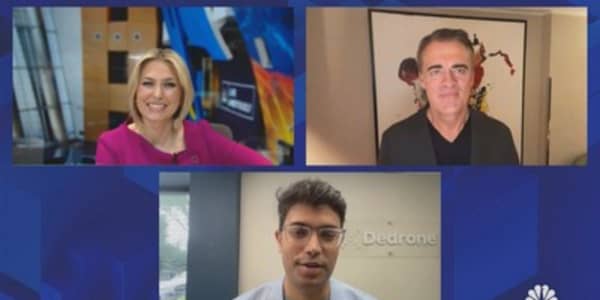Patents make good fences
Many start-ups receive tons of funding for swiftly taking control of an untapped market. Take Uber's $66 billion valuation. But that doesn't mean the ride-sharing company has such great patent protection. In fact, according to MCAM International, which provided CNBC with proprietary patent-scoring information for many Silicon Valley start-ups, Uber scores only so-so in the intellectual property department.
Being a first-mover to disrupt a sector is big, "but the bigger thing is, these are the companies that have taken the time and effort to make sure — before they raise their hand to say they've got a business opportunity to put out there — they've ring-fenced it with some proprietary rights that make their value higher," MCAM founder David Martin said during a recent CNBC appearance. "They're just better companies in terms of how they're going to last over the long haul."
For the 2016 CNBC Disruptor 50 list, CNBC enlisted MCAM to provide new visibility into the technology at the foundation of disruptive business models. MCAM chief analyst Dex Wheeler developed a scoring system for patent protection, defensibility of technology and disruptive potential (i.e., whether each company's technology represents a foundational shift in an industry or is merely an incremental improvement on an existing standard).
Here's a look at the 12 CNBC Disruptor companies that received scores of "100" on patent protection — and high marks overall.
— By CNBC's David Spiegel
Posted 16 June 2016
Okta
Patent protection: 100
Defensibility of technology: 100
Disruptive potential: 78.1
In March, Microsoft uninvited Okta from being a sponsor of its Ignite conference. According to Business Insider, Microsoft saw Okta as a competitor in mobility solutions. (Microsoft let Okta back in a day later). If Microsoft sees Okta as a serious enough threat, then Okta's ability to protect its technology and explain why it's different from Microsoft's offerings is critical to its future success.
"Okta's products should be secure from a patent standpoint," MCAM's Wheeler said, adding it has done an "excellent job" protecting its core products, a set of identity-management tools for enterprises.
Financing: $231.49 million
Valuation: $1.175 billion
MongoDB
Patent protection: 100
Defensibility of technology: 100
Disruptive potential: 99.6
"They developed solutions that are ... highly defensible, highly protected, actually responding to consumer requirements rather than telling the consumer what they should want," MCAM founder David Martin said.
Wheeler said MongoDB is able to open-source its database to its customers, but at the same time keep competitors from swiping the underlying technology. All that effort warranted near-perfect marks for Mongo and the best scores of any of the Disruptor 50 companies.
"The company has done an excellent job of patenting the software's core processes," said Wheeler. "Database durability, efficiency, optimization, reliability and data aggregation and replication have all been protected with patents."
Financing: $311.54 million
Valuation: $1.8 billion
Kabbage
Patent protection: 100
Defensibility of technology: 100
Disruptive potential: 98.2
The small-business lender's patent protections are all about speed. By automating operations, Kabbage can make quick decisions and deliver much-needed cash to its customers in a hurry.
"The company has patented fast, effective money transfers between different banks, social media integration into lending decisions, and methods for providing loans and cash advances for sellers using online auction sites," Wheeler said.
Financing: $316.48 million
Valuation: $1 billion
Ginkgo Bioworks
Patent protection: 100
Defensibility of technology: 100
Disruptive potential: 93.2
Ginkgo's patents focus on the basics of its organism engineering platform, as well as "specific applications in green energy and health," according to MCAM's Wheeler.
Gingko announced a $100 million in new fundraising on CNBC's Squawk Box last week. CEO Jason Kelly said the funding was needed to respond to "near-term commercial traction" producing artificial rose oil for the French fragrance company Robertet. But the patents point to opportunities to expand into pharmaceuticals, flavors, food sweeteners, even green energy.
"Ginkgo has ensured its place in our genetically modified future," Wheeler said.
Financing: $160.4 million
Valuation: $524.6 million
DAQRI
Patent protection: 100
Defensibility of technology: 100
Disruptive potential: 77.8
"Manipulation of virtual object in augmented reality via thought." Just let that sink in for a second.
Los Angeles-based DAQRI is leading the way in developing AR for use in industrial applications. Its patents cover everything from "gesture mapping" to "real-time image recognition." They read a little like science fiction, but the technology is real, and big-name customers like GE and Siemens are already testing it with their workforces.
Financing: $17 million
Valuation: N/A
Coursera
Patent protection: 100
Defensibility of technology: 100
Disruptive potential: 90.1
One of the pioneers of the massive open online course (MOOC), Coursera has patent protection around most of its basic infrastructure for hosting free classes from instructors at elite universities, like Princeton, UPenn and Stanford. This includes a patent for an online interface that can measure when and how a student interacts with information or video within the course.
But its most important protected technology, Wheeler said, may be around Coursera's ability to give students proof of performance, which is the Holy Grail for the MOOCs' attempt to replicate the effectiveness of the real classroom knowledge acquisition and retention experience.
"[Coursera] has patented methodologies for online-identity verification, which ensures students receive recognition for their accomplishments and allows for effective grouping of students based on learning styles," Wheeler said.
Financing: $146.27 million
Valuation: $402.36 million
Teespring
Patent protection: 100
Defensibility of technology: 33.3
Disruptive potential: 95
"Teespring has developed and patented very effective technology for pixel-by-pixel color matching and selection, which allows for unparalleled design-to-print accuracy," said Wheeler.
That gives it an edge over competitors like CustomInk and even traditional screen printers when it comes to staying true to the designer's vision. And as it partners with brands and sports teams, those partners can be confident that their trademarks will print true.
Financing: $58 million
Valuation: N/A
Motif
Patent protection: 100
Defensibility of technology: 48.3
Disruptive potential: 99.6
As more and more investors shift to passive, or index-based, investments that cut out the active portfolio manager, Motif's theme-based, community-sourced approach to investing should be a hot target for copycats. But Wheeler noted that "by patenting systems and methods to create, track, optimize and buy motifs, the company has secured its niche in the modern investing landscape."
Its patents include systems and methods to balance portfolios of securities, which keeps the weighting of equities in user-generated "motifs" in balance.
The lower defensibility score may be an indication that the landscape is getting crowded, though. Goldman Sachs is one of Motif's investors.
Financing: $126 million
Valuation: $436.43 million
Synack
Patent protection: 100
Defensibility of technology: 41.7
Disruptive potential: 83.8
Synack has secured patent protection for crowdsourced and automated security testing, both of which are core to the company's mission.
Take, for example, Patent # US9015847, a method inviting "a distributed plurality of researchers to participate in one or more computer vulnerability research projects directed to identifying computer vulnerabilities of one or more networks and/or computers that are owned or operated by a third party." In other words, this patent allows it to protect its deployment of an "army" of good, or "white hat" hackers against a variety of cyberthreats.
The booming cybersecurity industry is crowded, though, hence the lower score on defensibility. Cybersecurity companies large and small are scrambling to prove why their solution is the most comprehensive and most effective against growing, ever-evolving threats.
Financing: $34 million
Valuation: $115.51 million
23andMe
Patent protection: 100
Defensibility of technology: 100
Disruptive potential: 78.3
23andMe's patents cover personal genomic analysis, its core product. But perhaps more important to the company's long-term success are its patents that cover aggregating all of the individual profiles, allowing 23andMe to build a database, mine it for trends and identify new treatments for disease.
"23andMe's patented technology includes matching relatives within a DNA database, determining susceptibility to certain diseases and medical conditions, and the secure exchange of DNA data between users," Wheeler said. "The company could become an important source of data for researchers for years to come."
The company, whose CEO is the former wife of Google co-founder Sergey Brin, has received funding from GV (Google Ventures).
Financing: $241.6 million
Valuation: $1.1 billion
Houzz
Patent protection: 100
Defensibility of technology: 88.2
Disruptive potential: 74.2
The Houzz user experience may be the secret to its growth and a climb toward $1 billion in annual revenue, according to some industry followers. One specific patent protects many of its innovations in e-commerce, including applications that allow design professionals to upload photos and users to search them efficiently.
"Houzz's patent … [which] permits seamless and consistently formatted uploads of photos and other media … has helped make this application an exemplary e-commerce system," said Wheeler. The "passive relevance determination of content" means users get to find what they're looking for faster. Considering there are more than 10 million photos on the site, that's no small feat.
(Disclosure: Comcast Ventures, the investment arm of Comcast, CNBC's parent company, is an investor in Houzz.)
Financing: $213.75 million
Valuation: $2.3 billion
InsideSales.com
Patent protection: 100
Defensibility of technology: 100
Disruptive potential: 95.7
InsideSales, which uses artificial intelligence to identify sales leads and make sales teams more efficient, has a diverse patent portfolio to protect technology behind many aspects of its business.
"The company's patent portfolio includes innovations in call center optimization, topic popularity analysis, and email behavior monitoring and optimization," Wheeler said. "With strategic investments from Salesforce and Microsoft, InsideSales could soon become an industry standard."
Financing: $299.3 million
Valuation: $1.402 billion





